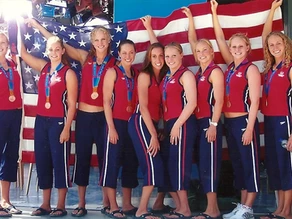Here at EC1 we’re very lucky to have an Olympic medalist on our team. As the Tokyo Games draw to a close, 2004 Olympic bronze-medalist, Lauren McFall Gardner, reflects on how her Olympic experience has shaped her life and career.
I was in my early 20s when I captained the bronze medal-winning US Synchronized Swimming team (now called Artistic Swimming) at the 2004 Olympic Games in Athens. Life as an athlete (and in a pool) was all I knew. I remember thinking, “Now what?”
My first post-athletic career decision was to attend the undergraduate degree program called General Studies at Columbia University in New York City. It was a place for students like me, who had an “alternative path” before attending college. It was intimidating to find myself a 25-year-old sophomore in college. At orientation, they told us, “don’t be late to class because then you will likely be mistaken as the teacher”.
I was advised by almost everyone I interacted with that my skills as an Olympic athlete would translate easily into success in college, and eventually in the job market. But I had such a hard time realizing what would translate. Nearly two decades later as I watched the 2020 Tokyo Games, I was inspired to reflect back on the skills I learned as an elite athlete and how they have supported me in my career, motherhood, and my life, all these years later.
Don’t Fear Failure
I was cut from the 2000 Olympic team squad 6 months before the Games. That was a tough blow. But training with that team gave me experience that I carried with me to the next team, where I was nominated by my teammates to be the team captain. I grew in that role and honed my leadership skills. During that time I came to the ultimate realization that I always had a choice in how I reacted to the situations I found myself in. And inevitably the way I reacted would affect the way the rest of the team reacted. With that choice came power. And the power of having a choice propelled me past fear.
Move Forward
After graduating from Columbia, I had an incredibly difficult time finding a job. Employers didn’t know what to do with me. Yes, I had an Olympic medal and a college degree from a top University, but there seemed to be no obvious place to put me. I wasn’t exactly entry-level, but I had no tangible job skills. I built a personal training business for myself which I relied on as I continued to hunt for a job but I never stopped moving towards my goal of landing a job that could be a long-term career. I knew I needed to evolve and move forward. One of my training clients knew a headhunter in Fintech and she handed him my resume. He called me two days later with a role idea where the CEO of the company had told him, “Find me an Olympic athlete, they will have the skills I’m looking for”.
Failure Is A Starting Point
Yes, back to failure. I get the sense that most people look at an Olympic medalist and assume the road was paved with continuous successes. And I can tell you decisively that’s not true. What that CEO understood about elite athletes is that we are well-versed in failure. We compete and get last place or 10th place, and we don’t quit because we didn’t win. We keep training and learning and focusing and continue competing. I remember my first Junior Nationals where I was poised to be the youngest swimmer to make Finals. I had prepared, trained and focused almost single-mindedly on that goal. But when competition day came, the combination of nerves and pressure got to me and I had a terrible performance and did not make Finals. I was completely devastated.
I spent the next year adjusting the way I trained, the way I viewed my goals, and the way I relied on the skills of my teammates and my coaches. The next year at Junior Nationals I won every event- solo, duet, team and compulsory figures, which earned me the spot to represent the US at the US Junior World Championships in Moscow, Russia. As a Fintech recruiter, I fail all the time….I get told “no” way more than I hear “yes”, sometimes I lose a client or I can’t close a deal. But my experiences with failure have taught me that the wins will come, if you move forward, learn from others, and adjust your attitude about the outcome.
Not a Zero Sum Game
Part of being on a team means that you will be surrounded by people that are better than you at something. Naturally, we were competitive with each other on our Olympic team. In fact, we had competed against each other in order to earn our spots on the team. The important nuance I learned is that my teammate could be better than me at something, but that didn’t make me less. My worth was my worth, and it was unrelated to others. More importantly, I could add their strengths to mine which made us all a much more formidable force. Once we got into the flow of adding and appreciating our collective strengths, we began to see ourselves climbing the podium with each competition. Excitingly, I get to see this kind of flow in so many of the companies I interact with in my role at EC1 Partners.
Make it Fun
Training for the Olympics is hard. Like, really hard. Our team suffered numerous concussions, popped ear drums, ER visits for emergency hydration, broken noses, dislocated joints and a bevvy of other physical hurdles. And of course the mental hurdles of training 8-10 hours a day, 6 days a week with only 2-3 weeks off a year. Some mornings I would stare at that pool at 5:30 am and think, “this is the day I won’t be able to do it.” And the thing that turned the tide? Making it fun. We found creative ways to tackle those early morning (often frigid!) pool entries. “Jump in like your favourite soup ingredient!” We had countless inside jokes that carried us through each day. And we found joy in the little things, like finding a power bar that actually tasted like candy, or finding the perfect sunblock layering technique so you don’t get burned after 8 hours in the sun.

Take Decisive Action
Decisive action is the choice of champions. No hemming, no hawing, no complaining, just take action. Worries and concerns should be accepted as possibilities, embrace them. The toughest situations and opportunities for decision-making will breed tremendous growth.
And finally, answers to the top 5 Olympic questions I get all the time:
5. No, even though I was team captain, if I drowned in the pool, the rest of the team would not have to drown as well.
4. The longest I’ve ever consecutively held my breath is 4.5 minutes. In our Olympic free program, we held our breath for a total of 3 minutes throughout the 4-minute program. And yes, I do miss the brain cells I lost during my swimming years.
3. No, we are not walking/standing on the bottom of the pool during our performance. It’s a 2-point penalty if any swimmer touches the bottom of the pool during the swim. We propel ourselves and each other out of the water purely on the strength of our legs and arms. Picture gymnastic skills- but with no gravity and while holding your breath.
2. Yes, the Olympic village is crazy and wild and fascinating and everything you’ve heard about. If you were in the best shape of your life, and you had just competed at the highest level and needed to relieve some stress- what might you choose to do with yourself? Exactly.
1. Just because I’m an Olympian doesn’t mean I’m good at everything. But I’d like to think it’s an experience that’s allowed me to impart some wisdom to people that ask me about it. May you be inspired, may you have fun, may you appreciate the people around you who are stimulating, visionary and enthusiastic, and may you live your life to the fullest, in whatever capacity that may be. And, make sure you pack a nose clip if you’re going to be upside down in water.


